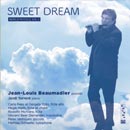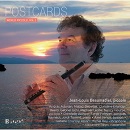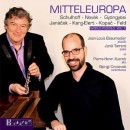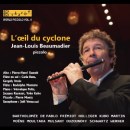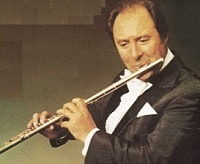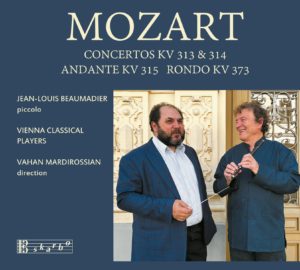 Jean-Louis BEAUMADIER, piccolo
Jean-Louis BEAUMADIER, piccolo
Vahan MARDIROSSIAN, direction
Vienna Classical Players
CONCERTO EN RE MAJEUR KV 314
ANDANTE EN UT MAJEUR KV 315
CONCERTO EN SOL MAJEUR KV 313
RONDO KV 373
Cadences de Véronique POLTZ
Tout au long de mes nombreuses lectures sur Mozart, deux citations m’ont interpellé sur la personnalité de Mozart et sur la transparence de sa musique:
Dans le livre, Musique ma vie de Jean-Pierre Rampal :
« Mozart offre une gamme de sentiments qui me satisfont profondément, sa musique est pleine de charme et d’ardeur, de tristesse et de profonde émotion, et, naturellement, d’un grand humour; toutes choses qui montrent son intime connaissance de l’âme humaine…
Mozart gagna pas mal d’argent dans sa vie, mais chaque fois qu’il se trouvait en fonds, il dépensait toujours jusqu’au dernier sous, régalant ses amis sans compter. Il semble que son but ait toujours été de faire plaisir à autrui, et il avait aussi ce besoin profondément humain d’être compris.»
Dans le livre Mozart, de l’ombre à la lumière de Jean-Victor Hocquard :
« Bien entendu, la voix humaine, surtout dans le registre féminin, a été aussi un puissant facteur de clarification, dans les opéras et les airs de concert. Ajoutons qu’à la fin de sa vie, Mozart a été sensibilisé à des instruments peu courants qui l’ont séduit par leur timbre cristallin : l’harmonica de verre et le glockenspiel. S’il les a utilisés, c’est parce qu’ils étaient pour lui la condition « sine qua non » de la poésie musicale. »
Ces deux citations m’ont guidé, que ce soit pour l’interprétation ou dans le choix du piccolo.
English version
From my many readings about Mozart, two extracts spoke to me about his personality and the transparency of his music.
In Musique, ma vie, a book by Jean-Pierre Rampal: « Mozart offers a range of feelings that deeply satisfies me. His music is full of charm and ardour, sadness and intense emotion, and naturally filled with humour. All things that reveal a profound knowledge of the human soul.
In his lifetime, Mozart earned quite a lot of money, but each time he was in a fund, he would give away every penny he had to his friends, without restraint. It seems like his purpose was always to please others, and he also had the deeply human need to be understood.”
In Mozart, de l’ombre à la lumière, a book by Jean-Victor Hocquard:
“Of course, the human voice, and the feminine voice in particular, has also been a powerful factor of clarification, in operas and concert tunes. We should add that by the end of his life, Mozart has been made receptive to uncommon instruments that seduced him by their crystal-clear tone: the glass harmonica and the glockenspiel. He used these instruments because they were the “sine qua non” condition to musical poetry. »
Both quotes have been guiding me, be it for interpretation or in choosing the piccolo.
Versione Italiana
Fra tutte le mie numerose letture su Mozart, due citazioni mi hanno colpito sulla sua personalità e sulla trasparenza della sua musica.
Nel libro “Musica, la mia vita” di Jean-Pierre Rampal:
«Mozart ci offre una gamma di emozioni che mi soddisfano profondamente, la sua musica è piena di fascino e ardore, di tristezza e profonda emozione, e naturalmente buonumore; tutte cose che dimostrano la sua intima conoscenza dell’anima umana…
Mozart ha guadagnato parecchio nella sua vita ma ogni volta che aveva il portafoglio pieno lo spendeva fino all’ultimo cent, viziando i suoi amici a profusione. Sembra che abbia sempre avuto la pulsione di fare piacere agli altri, e aveva anche questo bisogno profondamente umano di essere compreso.»
Nel libro « Mozart de l’ombre à la lumière » di Jean-Victor Hocquard:
«Beninteso, la voce umana, soprattutto nei registri femminili, è stata un potente fattore di chiarimento, nelle opere e nelle arie da concerto. A ciò si aggiunga che alla fine della sua vita Mozart è stato sensibilizzato a strumenti inusuali che l’anno sedotto per il loro timbro cristallino: la glassarmonica e il Glockespiel. Se li ha utilizzati è perché erano per lui la condizione sine qua non della poesia musicale.»
Queste due citazione mi ha guidato sia per l’interpretazione che per la scelta di utilizzare l’ottavino.
Deutsche version
Bei zahlreichen Lesungen über Mozart sind mir zwei Sätze über Mozarts Persönlichkeit und die Transparenz seiner Musik aufgefallen.
Im Buch „Musik mein Leben von Jean-Pierre Rampal: « Mozart bietet eine Reihe von Gefühlen, die mich zutiefst befriedigen. Seine Musik ist voller Charme und Leidenschaft, Traurigkeit und tiefer Emotion und natürlich voller großem Humor; Alles Dinge, die seine intime Kenntnis der menschlichen Seele zeigen … Mozart hat in seinem Leben ziemlich viel Geld verdient, aber wann immer er Geld hatte, gab er immer den letzten Penny aus, um seine Freunde ohne Zählung zu erfreuen. Es scheint, dass er ihm gehörte Sein Ziel war es immer, anderen zu gefallen, und er hatte auch dieses zutiefst menschliche Bedürfnis, verstanden zu werden. »
Im Buch „Mozart, vom Schatten zum Licht von Jean-Victor Hocquard:
« Natürlich war die menschliche Stimme, insbesondere in der weiblichen Stimmlage, auch in Opern und Konzertarien ein kraftvoller Klärfaktor. Fügen wir hinzu, dass Mozart am Ende seines Lebens auf ungewöhnliche Instrumente aufmerksam gemacht wurde, die ihn mit ihrer kristallinen Klangfarbe verführten: die Glasharmonika und das Glockenspiel. Wenn er sie benutzte, dann deshalb, weil sie für ihn die „unabdingbare Voraussetzung“ waren. Zustand der musikalischen Poesie. »
Sowohl hinsichtlich der Interpretation als auch der Wahl der Piccoloflöte waren diese beiden Sätze mein Leitfaden während der gesamten Aufnahme dieser Konzerte.
